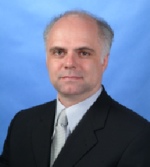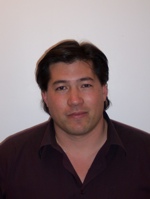Let's give this hand a hand!
Category: robots
Posted by Greg Laden at 8:34 PM • 7 Comments • 0 TrackBacks
Now on ScienceBlogs: Mock Study Section (more than you ever wanted to know)
A short description of this blog.
The Collective Imagination is designed to explore some of the most compelling issues facing the world today and the ways that science and technology can help us address them. A changing cast of ScienceBlogs bloggers and GE scientists will work collaboratively to explore security and personal surveillance technology, the AIDS crisis, and the infrastructure and transmission of energy, among other topics. The blog is sponsored by GE, with all editorial content overseen by ScienceBlogs editors.
Profile
 Greg Laden is a blogger, writer and independent scholar who occassionally teaches. He has a PhD from Harvard in Archaeology and Biological Anthropology, as well as a Masters Degree in the same subjects. He is a biological anthropologist, but for many years before going to graduate school to study human evolution, he did archaeology in North America. He thinks of himself as a biologist who focuses on humans (past and present) and who uses archaeology as one of the tools of the trade. Greg blogs regularly on ScienceBlogs at http://www.scienceblogs.com/gregladen/.
Greg Laden is a blogger, writer and independent scholar who occassionally teaches. He has a PhD from Harvard in Archaeology and Biological Anthropology, as well as a Masters Degree in the same subjects. He is a biological anthropologist, but for many years before going to graduate school to study human evolution, he did archaeology in North America. He thinks of himself as a biologist who focuses on humans (past and present) and who uses archaeology as one of the tools of the trade. Greg blogs regularly on ScienceBlogs at http://www.scienceblogs.com/gregladen/.
Profile
 Dr. Joseph J. Salvo attended Phillips Andover Academy, received his A.B. degree from Harvard University and his Master and Ph.D. degrees in Molecular Biophysics and Biochemistry from Yale University. Dr. Salvo joined the GE Global Research Center in 1988. His early work focused on the development of genetically modified bacteria and fungus, for the production of novel high performance polymers. In the mid 1990's he turned his group's efforts towards developing large-scale internet-based sensing arrays to manage and oversee
business systems. Most recently, he and his team have developed a number of complex decision engines that deliver customer value through system transparency and knowledge-based computational algorithms. Commercial business implementations of his work are currently active in Europe, and Asia as well as North and South America.
Dr. Joseph J. Salvo attended Phillips Andover Academy, received his A.B. degree from Harvard University and his Master and Ph.D. degrees in Molecular Biophysics and Biochemistry from Yale University. Dr. Salvo joined the GE Global Research Center in 1988. His early work focused on the development of genetically modified bacteria and fungus, for the production of novel high performance polymers. In the mid 1990's he turned his group's efforts towards developing large-scale internet-based sensing arrays to manage and oversee
business systems. Most recently, he and his team have developed a number of complex decision engines that deliver customer value through system transparency and knowledge-based computational algorithms. Commercial business implementations of his work are currently active in Europe, and Asia as well as North and South America.
 Dr. Peter Tu received his undergraduate degree in Systems Design Engineering from the University of Waterloo, Canada, and his doctorate from Oxford University England.
In 1997, he joined the Visualization and Computer Vision Group at the GE Global Research Center in Niskayuna, NY. He has developed algorithms for the FBI Automatic Fingerprint Identification System. He is the principle investigator for the ReFace program, which has the goal of automatically computing the appearance of a person’s face from skeletal remains. Dr. Tu has also developed a number of algorithms for the precise measurement of specular and high curvature objects. His current focus is the development of intelligent video algorithms for surveillance applications.
Dr. Peter Tu received his undergraduate degree in Systems Design Engineering from the University of Waterloo, Canada, and his doctorate from Oxford University England.
In 1997, he joined the Visualization and Computer Vision Group at the GE Global Research Center in Niskayuna, NY. He has developed algorithms for the FBI Automatic Fingerprint Identification System. He is the principle investigator for the ReFace program, which has the goal of automatically computing the appearance of a person’s face from skeletal remains. Dr. Tu has also developed a number of algorithms for the precise measurement of specular and high curvature objects. His current focus is the development of intelligent video algorithms for surveillance applications.
Please visit From Edison's Desk, which is Peter's home blog at GE Global Research.
December 31, 2009
Category: robots
Posted by Greg Laden at 8:34 PM • 7 Comments • 0 TrackBacks
December 23, 2009
Category: Artificial Intelligence
The Information Age is over - What's next? At a time in history with unprecedented access to global information streams, it may seem odd to some that the "Information Age" is already behind us. Traditionally a period of history can...
Posted by Joe Salvo at 8:45 AM • 33 Comments • 0 TrackBacks
December 11, 2009
Category: Artificial Intelligence
THE retail giant Westfield is considering introducing controversial face recognition technology at its Penrith shopping centre in Sydney's west. Unlike closed circuit television (CCTV), the identification system matches images captured by surveillance cameras to an existing database of faces. The...
Posted by Greg Laden at 1:45 PM • 4 Comments • 0 TrackBacks
December 10, 2009
Category: Artificial Intelligence
European researchers have developed a new approach to artificial intelligence that could empower computers to respond intelligently to human behaviour as well as commands. The dramatic rise in raw computing power due to parallel computing, super-clusters and the like, has...
Posted by Greg Laden at 11:44 PM • 0 Comments • 0 TrackBacks
December 6, 2009
"Scientists in Italy announced Wednesday that Pierpaolo Petruzziello, a 26-year-old Italian who had lost his left forearm in a car accident, was successfully linked to an artificial limb that was controlled by electrodes implanted in his arm and connected to...
Posted by Greg Laden at 2:51 AM • 0 Comments • 0 TrackBacks